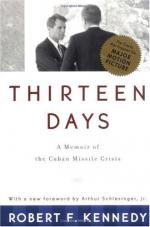
|
| Name: _________________________ | Period: ___________________ |
This quiz consists of 5 multiple choice and 5 short answer questions through Thirteen Days, pgs. 106-150.
Multiple Choice Questions
1. What word would best complete the following quote? "No action is taken against a powerful adversary in a _____________" (96).
(a) Benign manner.
(b) Nuclear world.
(c) Vacuum.
(d) War.
2. Who would not allow Russian planes to refuel or land in Dakar?
(a) Fidel Castro.
(b) The U.S. Navy.
(c) President Leopold Senghor.
(d) President Sekou Toure.
3. Who informed the President about the presence of Soviet missiles in Cuba?
(a) McGeorge Bundy.
(b) John McCone.
(c) Theodore Sorensen.
(d) Robert.
4. What did Adlai Stevenson suggest that offended many members of Ex Comm?
(a) JFK should hold a summit before any action is taken.
(b) The U.S. remove weapons from other countries in exchange for Russian removal of missiles.
(c) Both a blockade and an air strike.
(d) The nuclear bombardment of Cuba.
5. Which group was created "for the purpose of effective conduct of the operations of the executive branch in the current crisis" (45)?
(a) Organization of American States.
(b) Executive Committee of the National Security Council.
(c) Joint Chiefs of Staff.
(d) The Cabinet.
Short Answer Questions
1. What countries were supporting the U.S. and recommending that the U.S. not give in to Soviet demands?
2. Who was Tommy Thompson?
3. Who was the Director of the Federal Bureau of Investigation at the time of the Cuban Missile Crisis?
4. What possibility does JFK say everyone must accept if there is an invasion of Cuba?
5. Where is there a sign that states "in the nuclear age, superpowers make war like porcupines make love -- carefully" (108)?
|
This section contains 297 words (approx. 1 page at 300 words per page) |

|




